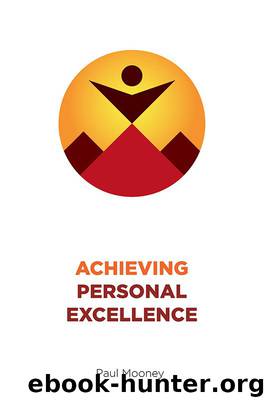Achieving Personal Excellence by Paul Mooney

Author:Paul Mooney
Language: eng
Format: epub
Publisher: Oak Tree Press
Section 3:
BRILLIANT COMMUNICATIONS
ARE YOU A GREAT FACILIATOR?
Every now and then a breakthrough idea occurs to me, something that really changes my consulting life. The BIG idea today is that… great facilitators have groundrules and skip lunch.
Who Owns the Monkey?
Facilitators are normally asked to work with individuals or groups who are struggling to resolve current issues (remedial agenda) or looking further out the road to unravel some future mystery (developmental agenda). In both cases, there is a ‘task’ to be completed. It’s my job to help the client achieve their goal and, hopefully, to have a bit of fun along the way. Business does not have to be boring.
Unsettling Tasks
Now, depending on the task and the people in the room, topics can be quite confusing, even unsettling. For example, the other day I was talking with a very successful guy who owns a large car dealership. He wanted to (big surprise here) sell more cars. But the fact that the Irish economy tanked had dinted his plans and there was no sign of relief on the horizon. As the size of the ‘cake’ is relatively fixed due to macro-economic factors (outside of his control), I moved the topic onto how he might increase the portion of cake that his business gets. Among a range of topics, we discussed the role of social media in marketing, how ‘conversations’ with his current clients and potential clients might help him sell more cars in the future. Turns out that this guy, a mechanic by training, does not use a computer and is quite a technophobe. So, he found this part of the conversation ‘uneasy’ and did not want to discuss it at all. The ‘minutes’ of our conversation would read as follows:
Let’s just go back to the Celtic Tiger when I sold shedloads of cars without having to learn any new stuff.
Underpinning Anxiety
At meetings to discuss today’s presenting issues or future problems, the debates are seldom linear and there can be all sorts of discomfort. When individuals or groups experience ideas that ‘challenge’ their current thinking (what psychologists call dissonance ), their instinct is to ‘close the conversation down’. To ease the anxiety, they want to stop the debate or make a quick decision, anything that helps to move away from the discomfort of the topic. But, because learning often comes ‘close to the edge of the cliff’, my role as a facilitator is to help the group to stay with the discomfort for as long as possible. How? I’ve found two techniques really work well:
♦ Having groundrules.
♦ Skipping lunch.
Having Groundrules
The idea of having some ‘groundrules’ for a meeting is hardly revolutionary – but it’s surprising how many meetings kick off without these being agreed in advance. There is no ‘single set’ of groundrules that works for every meeting – they need to be customised to the topic – but here’s a couple of ideas that I’ve found useful:
♦ Being co-operative and non-competitive (company hat, not functional hat).
♦ Creating a safe, supportive and trusting climate (OK to say: “I don’t know”).
Download
This site does not store any files on its server. We only index and link to content provided by other sites. Please contact the content providers to delete copyright contents if any and email us, we'll remove relevant links or contents immediately.
Bullshit Jobs by David Graeber(4179)
Radical Candor by Kim Scott(2711)
I Am Right, You Are Wrong by Edward De Bono(2439)
23:27 by H. L. Roberts(2245)
Nomadland by Jessica Bruder(2058)
Average Is Over by Tyler Cowen(1844)
The Conflict Resolution Phrase Book by Barbara Mitchell & Cornelia Gamlem(1772)
Out of Our Minds: Learning to Be Creative by Ken Robinson(1740)
High-Impact Interview Questions by Victoria A. Hoevemeyer(1691)
The Ideal Team Player by Patrick M. Lencioni(1640)
An Everyone Culture: Becoming a Deliberately Developmental Organization by Robert Kegan & Lisa Laskow Lahey(1631)
Who Moved My Cheese?: An Amazing Way to Deal With Change in Your Work and in Your Life by Johnson Spencer(1628)
The Asshole Survival Guide by Robert I. Sutton(1598)
Automatic Society by Bernard Stiegler(1547)
Unleashed by Anne Morriss & Frances Frei(1538)
Who by Street Randy & Smart Geoff(1501)
42 Rules of Employee Engagement by Susan Stamm(1463)
96 Great Interview Questions to Ask Before You Hire by Paul Falcone(1451)
Fish! by Stephen C. Lundin(1398)
